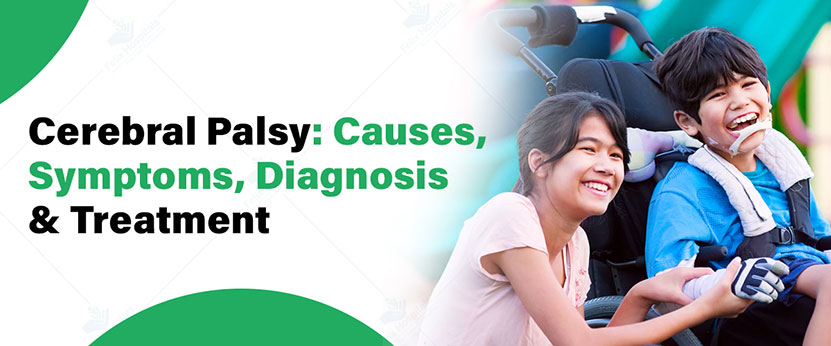
Subscribe to our

Cerebral palsy (CP) is a neurological disorder that affects movement, muscle tone, and posture. This condition is caused by abnormal brain development or damage to the brain before, during, or shortly after birth. With a prevalence of around 2–3 cases per 1,000 live births globally, CP significantly impacts the quality of life for individuals and their families. It is essential to understand its causes, symptoms, and treatment options to ensure effective management and improved outcomes. If you're seeking specialized care, consider consulting a neuro hospital in Noida for expert guidance.
If you or a loved one is affected by cerebral palsy, consult with the experienced neurologists at Felix Hospital. Contact us now at +91 9667064100.
Cerebral palsy is a neurological disorder caused by abnormal brain development or brain damage during early development, often before, during, or shortly after birth. The condition varies in severity and can affect movement, coordination, muscle control, and other bodily functions. While it is non-progressive, meaning it does not worsen over time, its symptoms can change as the child grows. Early diagnosis and intervention are essential for effective management.
Cerebral palsy can arise from a range of prenatal, perinatal, and postnatal factors:
Brain Infections: Conditions like meningitis or encephalitis that damage brain tissue.
Traumatic Brain Injury: Injuries resulting from accidents or abuse during infancy.
The symptoms of CP vary widely depending on the severity and areas of the brain affected.
Intellectual Disabilities: Present in some, but not all, cases of CP.
Diagnosing cerebral palsy requires a thorough evaluation to understand the child’s condition comprehensively.
Cerebral palsy management is tailored to individual needs, aiming to improve mobility, independence, and quality of life.
While some causes of CP cannot be prevented, specific measures can reduce risks.
Effective care for cerebral palsy requires a multidisciplinary approach that includes neurologists, therapists, and support from families. At Felix Hospital, we have a team of experienced specialists dedicated to providing comprehensive care:
Our team combines medical expertise with compassionate care to improve the quality of life for individuals with CP.
Reach out to Felix Hospital’s multidisciplinary team of specialists today to get the support you need for your child's development. Book an appointment now!
Cerebral palsy is a complex condition, but early intervention and a holistic care approach can significantly enhance outcomes. Understanding its causes, symptoms, diagnosis, and treatment options empowers families to make informed decisions. Prevention strategies during pregnancy and early childhood further reduce risks.
If you or a loved one requires expert guidance, reach out to the neurologists at Felix Hospital for a tailored treatment plan. Remember, timely care and support can make a world of difference in managing cerebral palsy and ensuring a brighter future for those affected.
1. What causes cerebral palsy?
Ans: Cerebral palsy can result from genetic mutations, infections during pregnancy, oxygen deprivation to the brain, complications during delivery, premature birth, brain infections, or traumatic injuries.
2. How is cerebral palsy diagnosed?
Ans: Diagnosis involves a clinical exam, developmental history review, and imaging tests like MRI or CT scans. Genetic tests and assessments for vision or hearing problems may also be conducted.
3. What are the symptoms of cerebral palsy?
Ans: Symptoms include muscle stiffness (spasticity), involuntary movements (dyskinesia), coordination problems (ataxia), delayed milestones, speech difficulties, and potential intellectual disabilities.
4. Can cerebral palsy be cured?
Ans: There’s no cure, but early intervention with therapies (physical, occupational, speech) can improve mobility, communication, and overall quality of life.
5. What treatments are available?
Ans: Treatment includes medications for spasticity and seizures, therapy for strength and coordination, surgeries for deformities, and assistive devices like braces or wheelchairs to aid mobility.
6. Can cerebral palsy be prevented?
Ans: While not all causes are preventable, prenatal care, vaccinations, avoiding harmful substances, and infant safety can lower the risk.
7. Can someone with CP have a baby?
Ans: Yes, people with CP can have children. While fertility isn’t affected, pregnancy may require tailored care due to muscle spasticity or mobility challenges.
8. Can cerebral palsy affect speech?
Ans: Yes, CP can impair speech due to difficulty controlling the muscles involved, often causing slurred or slow speech.
9. Can ultrasound detect cerebral palsy?
Ans: No, ultrasound cannot confirm CP but may identify brain injuries or risks like hypoxia linked to CP.
10. Can brain injury cause cerebral palsy?
Ans: Yes, brain injuries from birth complications, infections, or trauma are significant causes of CP.